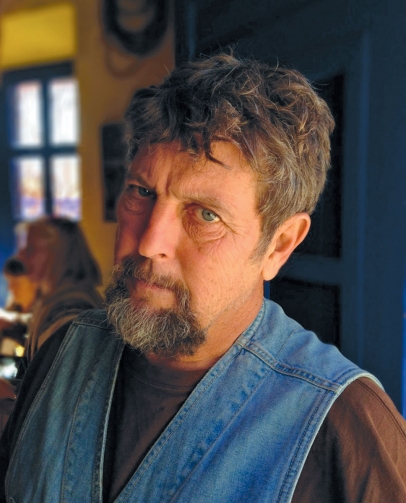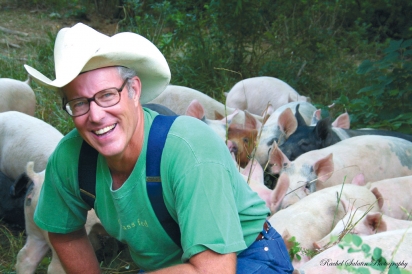A Tale of Two Views: Gary Nabhan and Joel Salatin
Gary Paul Nabhan: The Soul of Sustainability by Nancy Kelso
Gary Paul Nabhan and Joel Salatin have become giants in the world of sustainable food concerns, influencing practice, public discourse, and policy. And, while their lives’ work is similar in nature, these two giants couldn’t provide more evidence of the reality that it takes all kinds. Salatin, agitated and agitating the masses, is confrontational; Nabhan, calm and cultivating understanding, is invitational. Salatin buzzes; Nabhan hums. We sat down with them at the Mother Earth News Fair in Topeka this past October – much to our delight.
Officially he is an ethnobotanist; unofficially he is the father of the local food movement. As a former English teacher and pastor, I was drawn to this MacArthur Genius Award recipient, Ecumenical Franciscan Brother, poet, scholar, teacher, farmer. As we began to talk, gentleness, wisdom, humility, and compassion radiated from his eyes and resonated in his words. In the first few moments of our conversation, he made multiple references to being mentored, to learning from the elders. And, now, he has become our regarded elder, and when he talks you don’t want to miss a word.
eKC: How did you get started in all of this?
GPN: I was born into a family of grocers and fruit peddlars, so I always knew what good food produced in a good way tasted like. In the early 1970s, I left my boyhood home in Gary, Indiana for Cornell College in Mt. Vernon, Iowa. My intent was to study conservation and ecology. But, I soon realized that wildlife biology could be paired up with food studies; food and farming could go together. Back then there weren’t people cross walking things. It was something to explore. So, Wes Jackson and Wendall Berry became my mentors.
I actually dropped out of college to work at the first Earth Day headquarters when I was seventeen years old. I thought, “If these people are right, and we are hurting the planet, I need to see some of those places before they disappear.”
I think it was my own personal ethnic heritage that lead me to the Southwest. I wanted to learn how to work in the dry climate to provide food. There was a subconscious pull to the desert because my grandfather was of the desert people in Syria and Lebanon.
I wanted to be mentored by the elders of the indigenous peoples of the Southwest where they have 4100 years of continuous agriculture.
eKC: What about the Kansas City area? What is the food history of this place?
GPN: Fifty years ago every farm was diverse – mixed grain, vegetable, etc. We are getting a lot of that back from seed saving groups. In fact, a lot of the finds have been in Kansas and Missouri. The vegetable diversity has been retained pretty well.
What has been lost, however, is the grain diversity. Wheat was vulnerable to rusts and diseases. So, that grain goes away. We find this in the records from 50 years ago because they were not saving seeds of diseased plants. The good news is that the heritage grain business is growing. For example, Tom Leonard, a bakery owner in Lawrence, has a Turkey Red Fife wheat from Kansas.
On the other hand, we have a lot of fruits that have been retained. The diversity is really hidden in the landscape; the small abandoned orchards in Eastern Kansas, for example, have a lot of the old heirlooms. Frank Reese has been instrumental in the heritage turkey revival. These are not just museum pieces; they can provide economic benefits on a small scale. Maybe they can’t compete with large-scale companies like Hormel, but they can successfully bring these products to local chefs.
And, more broadly, the work of organizations like Ark of Taste and Slow Food are instrumental in renewing American food traditions. It is important to realize that heritage and sustainability are integrated.
eKC: What are we not doing here with regards to the sustainability movement?
GPN: An issue that we are currently addressing is the impact of pervasive use of Roundup. Where we used to have 700 million milkweed plants, we also had numerous monarch butterflies and a hundred types of native bees. Now it is the heart- land where we see the greatest depletion of these pollinators. I am currently working with Chip Taylor from Lawrence to restore wildlife habitats for birds and pollinators. These really are unintended problems – superweeds, extinction of pollinators, loss of beneficial insects and biodiversity in general. The emphasis on increasing soybean yield included getting rid of hedge rows and wind breaks in which native nectar plants used to grow so that more acres could be cultivated.
The bottom line is that industrialization of agriculture has caused ecology to suffer. The sole purpose of our agricultural lands is not to make ethanol for our cars, but to feed real people. We need to give farmers incentive to practice whole system farming. For example, prairie filter strips not only stop erosion, but also provide a habitat for pollinators.
Ultimately we have to do what is good for our kids and our lands. Land health equals human health.
eKC: How do we create the change that needs to happen?
GPN: First, we need to have ethical discussions about our food ecology. We talk about ethics in medical issues and genetics, etc. I think our churches and ethicists need to engage this topic.
Food and faith are real issues. In urban areas, it is usually the faith-based communities that keep the hungry fed. Someone might be an anti-immigration republican, but if their church is feeding the poor, they engage. This is loving our neighbors.
We really shouldn’t be so polarized. We all need to be involved in public discussion about food democracy. Edible magazines can build positive dialogue between groups who don’t talk to each other. Let’s get everyone in the tent rather than a few people outside the tent pissing on us.
eKC: What’s your role in this process?
GPN: Love for creation and gratitude to the creator drives a lot of what I do. I came to it late. Scientists don’t talk values. I got so old that I don’t care. I don’t have to hide anything. This is about caring for your neighbor and caring for creation.
I want to insert the spiritual in a gentle way. There is a lot of collateral damage due to ag getting bigger and bigger. We can find options that do less damage. There are ethical elements about how we communicate about food and farming. It doesn’t work to beat people up as a scientist. We have a very polarized political scene. I want to figure out ways to walk towards farmers and ranchers. I want to engage partners in healing the wounds.
Our bodies want our distracted minds to remember this:
It is those slow foods,
The ones that have moved the least
From field to feast
That move us most deeply
For they have remained dynamic and delectable
So as to dance in our dreams forever.
Our dirt-tired Earth Mother is asking us to step outside For she is angry that some of us can barely see or smell Just what it is that is growing in our own back yards.
From The Food Crisis Is Our Energy Crisis by Gary Paul Nabhan
“We need to have ethical discussions about our food ecology.”
Joel Salatin: Hero of Heretic Farmers by Mike Hursey
I think of Joel Salatin as the Muhammad Ali of farming – brash, provocative, forcing the issue, not backing down, and highly entertaining. With a fervor fueled by a frequently infuriating modern American corporate commercial agricultural system, Salatin is a sought after speaker on topics of sustainable farming and food policy. The author of nine books, three of which I recommend as winter reads, Salatin is certain to get you pumped up about standing up to laws and rules that make no sense and getting involved in the food revolution.
eKC: What do you think about recent efforts to mandate GMO labeling?
JS: We should always vote with our dollars and support the companies that label honestly. The bigger issue is the role of government. When it comes to agriculture, I fall in line intellectually with a Jeffersonian approach; Thomas Jefferson believed that when government gets involved it is bad. Keep government out of it. The power of the people is always better.
eKC: How do we get the government out of our food systems?
JS: We need to get creative and get out of the box. Take Florida, for example. There are individual farmers working directly with school districts. The farmers sell the higher quality cuts of meat to school families, and the remaining lower quality cuts are sold to schools for kids’ lunches. The challenge, of course, is that it requires people to be involved.
In general, individuals have become ignorant of our food system. Because of the lobbyists, among others, the government believes that we will not be able to feed the people of the world without chemicals. People have accepted the belief that efficiency is needed to raise enough food to feed the world and that efficiency requires mono-speciation and chemicals to make the farmer’s job easier. But, the ideas of the past have been proven wrong before, and the current thinking will be overturned eventually. People need to be educated, and that is how we can make a difference and make change.
eKC: So what does the average person need to understand and change to become part of the solution?
JS: First, if the public would not eat any fast food for three days, the corporate commercial food system would be brought to its knees. If you’ve seen the movie Food, Inc. you might remember the family of four who went through a fast food drive thru and spent eleven dollars. They said that they could not afford to eat healthy. I hear that all of the time.
One time in New York, someone told me that they could not afford to eat healthy. So, I took them to the most expensive farmers’ market in NYC and told them to buy the most expensive potato. That person found some fingerlings selling for $2 a pound. Next we went to a nearby grocery store where I handed them a one pound bag of chips that cost $4.
Not only that, I’ll bet that if we went to your house, we would an iPad, an Xbox, a big screen TV, frozen dinners, boxed dinners, snacks galore, soda pop, Starbucks cups, and many non-essential items that are all over priced. It is a matter of priorities.
A major change we can make is to get people back into the kitchen. As a population, we are suffering from culinary ignorance. Fifty-percent of meals are eaten out. Seventy- percent of Americans don’t know at 4 p.m. what they are eating for dinner that night. A home-centric food system is needed. We need to rediscover the culinary arts, and we need to reinvent the larder. It is significantly less expensive and far healthier to cook and eat at home than it is to go out for meals. An “Egg McMuffin” is around $3; an egg sandwich cooked at home is less than $1, and with whole grain bread and farm fresh eggs, it is a health food!
eKC: Are we winning in our battle for good food?
JS: No. We are still going backwards. I believe we will win, I just don’t know when it will be. To win we need to be herectics, and we need to unite. At one time, popular belief said the earth was flat. It was heretics who stood at odds with generally accepted opinions. But, that changed.
Right now, popular belief says GMOs are the answer to all our problems. Sick animals need pharmaceuticals. Our plants are sick, so they must need chemicals. Right now, you are a heretic if you believe that nature’s pattern is wellness, that soil is alive, that the environment should have good bugs that eat the bad ones, and that diversity on our farms allows animals to be naturally healthy.
To win the battle for good food, we must create an environment where good outweighs bad literally and figuratively.
“A major change we can make is to get people back into the kitchen.”






